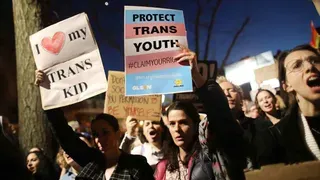April 16, 2010
Sen. Kerry Pushes for Investigation into GLBT Exclusion from Clinical Trials
Kilian Melloy READ TIME: 4 MIN.
The so-called "Ick Factor"--a response of distaste on the part of the general public when it comes to gay sexuality--may have an impact on GLBT equality at the ballot box, but in the arena of science, such responses are not, in theory, supposed to play a role in who is included--and who is excluded--in clinical investigation.
Clinical investigation into certain areas involving sexuality and families, however, seem to be suspiciously gay and lesbian-free. Massachusetts Sen. John Kerry wants to know why.
In a letter dated April 15, Kerry--together with Sens. Jeff Merkley (D-Ore.), Kirstin Gillibrand (D-N.Y.), Sherrod Brown (D-Ohio), and Robert Menendez (D-N.J.)--asked Health and Human Services Secretary Kathleen Sebelius to look into the question of why clinical trials have seemingly been excluding GLBT individuals and families. The trend was demonstrated by a recent study undertaken by the New England Journal of Medicine.
In the letter, the senators noted that the "study found that gay and lesbian patients were barred from participating in clinical trials of drugs, mostly but not all dealing with sexual function. It was found that in some studies participants had to be in a 'relationship with a person of the opposite sex' or the study contained explicit inclusion and exclusion criteria based on sexual orientation." Added the letter, "We would like to ascertain if the Food and Drug Administration (FDA), National Institutes of Health (NIH) or any other federal health agency has any such restrictions on clinical trials and if so what medical rationale exists for such restrictions. We would also like to inquire to what extent restrictions such as these could result in inaccurate medical information and flawed trials.
"The Journal studied a clinical trial database that had information on clinical trials sponsored by the National Institutes of Health, other government agencies, and private industry," continued the senators' letter to Sebelius. "Using keywords, their search resulted in 243 studies that had criteria excluding gay men and lesbian patients from participating. On closer examination of these 243 studies a troubling uptick in the incidence of exclusions can be seen. In studies conducted prior to 2000 only 2 studies were shown to absolutely exclude gay men or lesbians. However, from 2000-2004 that number grew to 9 and from 2005-2009 it almost tripled to 26. The Journal's conclusion was that, 'Exclusion of lesbians and gay men from clinical trials in the United States is not uncommon,' and that most likely these participants don't know and aren't notified that their sexual orientation is the reason they are excluded."
The letter went on, "Obviously, we would all agree that absent a medical rationale for these exclusions, holding clinical trials that prohibit the use of gay and lesbian patients is discriminatory and unnecessary. Individuals that are willing to participate in these trials are supporting medical research and advancements--it doesn't make sense and violates our values if any qualified potential participant is turned away solely based on their sexual orientation."
In an April 15 news release, Kerry said, "The New England Journal of Medicine is the gold standard for the medical community, and their study set off alarm bells. This is more than an equality issue. It raises huge questions about the quality of medical information from flawed trails," said Senator Kerry. "I can't think of a medical or scientific reason so many clinical trials would discriminate based on sexual orientation, and I'm confident that Secretary Sebelius will get to the bottom of this."
Left Out of 'Sexual Function' and Family Studies
A March 17 New York Times story covered the Journal's findings, reporting that the exclusion of gays seems to take place in studies involving "sexual function"--such as erectile dysfunction or decreased sex drive--or studies that examined the impact of treatments on families. "Out of 243 such studies, 37, or 15 percent, explicitly excluded gay men and lesbians," the article noted.
"There is likely a copy-and-paste component of this going on," the paper's lead author, Brian L. Egleston, told the New York Times, meaning that subsequent studies simply re-used the criteria set out by earlier studies.
But carrying forward trends from the past is no excuse when it comes to issues of discrimination, the senators indicated. "For years, women were excluded from participating in clinical trials of medical treatments," Merkley said in the news release. "This meant that American women were not represented in medical research of diseases and treatments that were prevalent among both men and women. Today, this trend continues with individuals being excluded on the basis of sexual orientation. This is just wrong--it undermines rigorous scientific testing and it is morally reprehensible." Continued Merkley, "Medical research should not be biased. We need to get to the bottom of any possible effort to exclude Americans from clinical trials."
"We must eliminate this kind of unconscionable discrimination," Gillibrand declared. "This is not only an issue of equality and fairness, it is also about allowing scientists to use every appropriate tool to advance medical research and save lives. These trials could result in safer, more effective medicines for participating patients and the general public." Added Gillibrand, "I am also concerned that such restrictions could result in flawed medical information and inaccurate trial results."
"Clinical trials not only help advance medical care and improve our health system, but they can mean the difference between life and death for individuals and families," Menendez remarked. "Discrimination is wrong in any context, but discrimination in clinical trials is particularly troubling because it limits an entire community's access to medical care. Getting answers on this will help us make sure that these trials are open to every member of our society."
The president of the nation's largest GLBT lobbying organization, the Human Rights Campaign (HRC), also commented. Said the HRC's Joe Solmonese, "We are deeply disturbed by the findings of the New England Journal of Medicine study that excluding lesbians and gay men from clinical trials is 'not uncommon,' particularly because we still have so little data on health needs of the LGBT community," Added Solmonese, "We applaud Senator Kerry for taking this important issue to Secretary Sebelius and urge HHS to investigate and ensure that this important part of medical research is conducted in a science-based, nondiscriminatory manner."
Kilian Melloy serves as EDGE Media Network's Associate Arts Editor and Staff Contributor. His professional memberships include the National Lesbian & Gay Journalists Association, the Boston Online Film Critics Association, The Gay and Lesbian Entertainment Critics Association, and the Boston Theater Critics Association's Elliot Norton Awards Committee.






